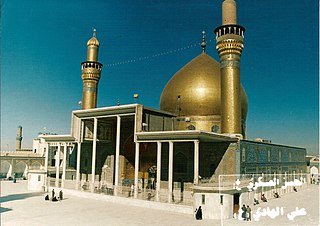
The Canal Hotel bombing was a suicide truck bombing in Baghdad, Iraq, during the afternoon of 19 August 2003. It killed 23 people, including the United Nations' Special Representative in Iraq Sérgio Vieira de Mello, and wounded over 100, including human rights lawyer and political activist Amin Mekki Medani. The blast targeted the United Nations Assistance Mission in Iraq created just five days earlier. The 19 August bombing resulted in the withdrawal within weeks of most of the 600 UN staff members from Iraq. These events were to have a profound and lasting impact on the UN's security practices globally.
Events in the year 2005 in Iraq.

At approximately 6:44 a.m. Arabia Standard Time on 22 February 2006, al-Askari Shrine in Samarra, Iraq, was severely damaged in a bombing attack amidst the then-ongoing Iraq War. Constructed in the 10th century, it is one of the holiest sites in Shia Islam. Despite the magnitude of the explosions, there were no casualties. American president George W. Bush asserted that the bombing had been carried out by Al-Qaeda in Iraq, which denied involvement in the attack.
The February 2007 Al-Saydiya market bombing was the detonation of a large truck bomb in a busy market in the Iraqi capital of Baghdad. The suicide attack killed at least 135 people and injured 339 others. The bomb, estimated to be about one ton in weight, brought down at least 10 buildings and coffee shops and obliterated market stalls in a largely Shi‘ite enclave less than a half-mile from the Tigris River.
On 18 February 2007, three car bombs exploded in predominantly Shia areas of Baghdad, killing at least 63 people and injuring 131. The bombings occurred despite a huge military offense, led by US and Iraqi troops, starting days before.
The 18 April 2007 Baghdad bombings were a series of attacks that occurred when five car bombs exploded across Baghdad, the capital city of Iraq, on 18 April 2007, killing nearly 200 people.
The al-Khilani mosque bombing occurred on 19 June 2007 when a truck bomb exploded in front of the Shia Al-Khilani Mosque in Baghdad, Iraq. At least 78 people were killed and another 218 injured in the blast. The explosion occurred just two days after a four-day curfew banning vehicle movement in the city was lifted after the al-Askari Mosque bombing (2007), and just hours after 10,000 US troops began the Arrowhead Ripper offensive to the north of Baghdad. Because the site was a Shia mosque, the bombing is presumed to have been the work of Sunnis. The Sinak area where the explosion took place was also the targeted by a suicide car bomber on 28 May 2007, which resulted in 21 deaths.
In the Parachinar bombing of 16 February 2008, a suicide bomber in Parachinar, Pakistan killed 70 people and injured 110 attending a political rally for the opposition Pakistan Peoples Party. The attack occurred on the eve of the 2008 Pakistani general election to be held on 18 February when an explosives-laden car was rammed into the election office of an independent candidate in Parachinar. The attack targeted people in a rally outside Riaz Shah's campaign office.
On 23 April 2009, two separate suicide attacks occurred in Baghdad and Miqdadiyah. At least seventy-six people are known to have died in the attacks, including several Iranian pilgrims. The Los Angeles Times puts the death toll at seventy-nine. Most of the forty-eight people killed in Muqdadiyah, near Baqubah, Diyala Province, are believed to have been Iranian nationals. According to the BBC, if the death tolls are confirmed, these attacks were the most lethal of 2009.
In January 2011, a series of insurgent shooting and bombing attacks were launched throughout Iraq.
On 22 December 2011, a series of coordinated attacks occurred in Baghdad, Iraq, killing 69 people. This was the first major attack following U.S. withdrawal from Iraq.
Throughout January 2012, a series of bombing and shooting attacks took place in multiple locations in Iraq, seemingly targeting Shia Muslims.
During the first two weeks of July 2013, a series of coordinated bombings and shootings struck across several cities in Iraq, killing at least 389 people and injuring more than 800 others.
Shia Muslims have been persecuted by the Islamic State (IS), an Islamist terrorist group, since 2014. Persecutions have taken place in Iraq, Syria, and other parts of the world.
On 28 February 2016, at least 70 people were killed and 60 wounded in Sadr City, a southern suburb of Baghdad, as two bombs went off at a crowded market. The explosions ripped through a market selling mobile phones in the mainly Shiite Muslim district. The assailants were suicide bombers riding motorcycles through the crowd.
In May 2016, the Islamic State conducted a series of bombing attacks in and around Shia neighbourhoods in Baghdad, the capital of Iraq, killing and wounding hundreds. According to ISIL, attacks were aimed at Shia fighters.

On 3 July 2016, ISIL militants carried out coordinated bomb attacks in Baghdad that killed 340 civilians and injured hundreds more. A few minutes after midnight local time, a suicide truck-bomb targeted the mainly Shia district of Karrada, busy with late night shoppers for Ramadan. A second roadside bomb was detonated in the suburb of Sha'ab, killing at least five.
On January 2, 2017, at least three suicide car bombings took place in a Shia Muslim eastern district of Sadr City, as well as behind the Kindi and Imam Ali hospitals, killing 56 people and injuring more than 120 others. Haider al-Abadi, Iraq's prime minister, had informed in a news conference that the suicide bombing, in Sadr City's busy market, was operated by the suicide bomber who detonated a vehicle with explosives. The bomber had pretended to hire day labourers in the market; once labourers gathered near the vehicle, the vehicle was detonated by him. The French President François Hollande was in the city during the attacks.



